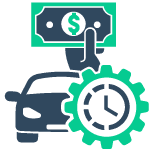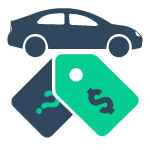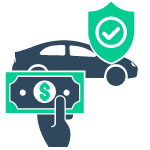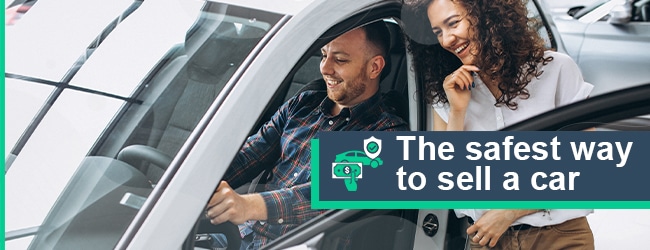Quick Answer:
For a safe car sale, vet potential buyers by requesting their personal details like name, contact number, and address. Be cautious if someone avoids in-person or phone conversations or hesitates to share personal information, as this could be a warning sign. Ensure protection as a seller by settling on a secure payment method, signing a bill of sale, and informing the DMV about the sale, which absolves you of any liabilities.
Key Takeaways:
- Security in Selling: Ensure a safe car sale by carefully screening buyers, using secure payment methods, and completing a bill of sale.
- Fraud Awareness: Stay alert to common scams like overpayment and counterfeit checks to protect yourself during the transaction.
- Reliable Selling Platforms: Choose well-known and secure platforms or online car-buying services for a safer and more efficient selling experience.
Best for Older & Damaged Cars

Buys used, damaged or junk cars
Free tow and no hidden fees
Pays by ACH trasfer or check
Top Pick for Junk Cars

Free, no-obligation cash offers
Offers free paperwork service
Pays on the spot upon pick up
The Safest Way to Sell a Car:
1. Select a Secure Platform for Selling
When choosing a secure platform to sell a used car privately, it’s crucial to consider the platform’s reputation and security features. CarGurus and Autotrader are two popular choices, each offering unique benefits.
CarGurus, for example, provides two options for sellers: an instant cash offer, available in over 20 states, and private listings. Their system ensures that vehicles sold through cash offers are picked up from your preferred location, with payment made via bank transfer or check.
CarGurus offers a purchase protection plan, which verifies and secures online transactions with $75,000 in protection managed by a third-party service provider, AUTOPAY Direct, Inc.
If you are looking for a quick way to sell a car online, car-buying companies like Peddle (BBB rating 4.65 out of 5), Wheelzy (BBB rating 4.57 out of 5) and CarBrain (BBB rating 4.91 out of 5) are the safest options available.
When assessing the security of a platform, consider the following:
- Reputation and Reviews: Check the platform’s ratings and accreditation, such as the BBB or Trustpilot rating. Read user reviews to understand other sellers’ experiences.
- User Verification Features: Look for platforms that have measures to verify the identity of buyers and sellers.
- Secure Payment Options: Ensure the platform offers secure payment methods, like bank transfers or checks, and avoid unusual financial requests from buyers.
- Customer Support: Good customer support can be crucial in resolving any issues or queries you might have during the selling process.
- Communication System and Privacy Protection: Platforms should have secure communication systems to protect your personal information.

2. Screen Buyers
To screen buyers and avoid scams when selling a used car, there are several important steps you can take:
- Buyer Profiling: Obtain their contact information and phone number, and prioritize phone conversations over text or email to better gauge legitimacy, as scammers often hide behind anonymous email accounts.
- Maintain Professionalism: Approach the sale as a business transaction, remaining alert to any unusual stories or payment requests.
- Encourage Questions: During your conversations, prompt buyers to ask questions. This can help you weed out those who aren’t seriously interested.
- Choose Safe Meeting Locations: Opt for well-lit, public places like mall parking lots or police stations for meetings, and always during daylight hours.
- Request Identification: Clearly state that you will ask to see their driver’s license before any test drive to discourage individuals with criminal intentions.
- Test Drive Precautions: Ask who will be present for the test drive. Be cautious of vague or evasive answers, as these could indicate a safety risk.
- Clear Payment Terms: To prevent financial scams, specify acceptable payment methods upfront, avoiding money orders, payment plans, overpayments, and personal checks.
- Avoid Hasty Decisions: Genuine buyers typically have questions and may want to negotiate. Be wary of overly eager buyers or those making unusual financial proposals, as these could be red flags for scams.
By following these guidelines, you can significantly reduce the risk of scams and ensure a safer selling experience. Remember, it’s better to be cautious and miss out on a potential sale than to rush into a transaction that doesn’t feel right.
3. Implement Safety Measures During the Test Drive
To streamline and secure the process, adhere to these guidelines:
- Route Planning: Establish a test drive route in advance. Select a public and secure location, preferably near areas with security measures like a bank parking lot or close to a police station.
- Safety Measures: Always have a friend accompany you for added security. Organize test drives during daylight in busy areas to enhance visibility and safety.
- Verify Identification: Require a photo of the potential buyer’s driver’s license before they test your car.
- Set Expectations: Predefine the test drive duration, route, and any restrictions. Clearly communicate these details to the buyer to prevent any confusion.
- Participate in the Test Drive: Join the buyer during the test drive. This allows you to monitor their driving style and answer any queries about the car’s features and handling.
4. Agree on Safe Payment Method
When selling a car privately, choosing safe payment methods is crucial to avoid scams and ensure a secure transaction. On the other hand, certain payment methods pose significant risks and should be avoided.
Safe Payment Methods:
- Bank Drafts: Bank drafts have guaranteed funds, making them a secure option.
- Certified Cashier’s Checks: These are issued directly by the bank and require the full amount to be available in the buyer’s account. However, there’s still a risk of counterfeit checks, so it’s best to verify the check at the issuing bank.
- Escrow Services: The service holds the funds in an escrow account until all aspects of the sale are finalized, offering legal protection and assurance.
- PrivateAuto Pay: This method requires both parties to verify their identities using driver’s license verification and facial recognition technology.
- Cash: Carrying large sums of cash can be risky, so it’s recommended to conduct such transactions at your bank, where you can immediately deposit the money.
Risky Payment Methods:
- Personal Checks: Accepting personal checks is generally not advised due to the risk of insufficient funds or bounced checks.
- Payment Plans: These arrangements are risky as they depend on the buyer’s continued willingness and ability to pay over time.
- Third-Party Payment Methods: Be cautious of unfamiliar or complex payment methods proposed by the buyer. Stick to straightforward, verifiable methods to avoid scams.
- PayPal and Venmo: While these platforms are popular for online transactions, they do not offer protection for car sales.

5. Sign the Bill of Sale
You should sign a bill of sale when selling your car, even if it is not legally required in your state.
A bill of sale is a legal document that transfers ownership of the vehicle from the seller to the buyer. It also provides proof of the sale, which can be helpful in case of any disputes down the road.
Reasons why you should sign a bill of sale when selling your car:
- Protects you from liability: if you do not sign a bill of sale, you could still be held liable for any accidents or other problems that the buyer causes with the vehicle.
- Proves the sale: A bill of sale is a legally binding document that proves that you sold the vehicle to the buyer.
- Provides a record of the sale: A bill of sale provides a record of the sale, including the date of the sale, the purchase price, and the names and addresses of the buyer and seller. This information can be helpful for tax purposes or if you need to prove that you sold the vehicle.
- Makes it easier for the buyer to register the vehicle: In most states, the buyer will need to show a bill of sale in order to register the vehicle in their name.
6. Sign Release of Liability and Inform DMV
A release of liability form, when selling a car, officially shifts legal responsibility from the seller to the buyer. This form is crucial as it safeguards the seller against any liabilities, such as accidents or parking violations, associated with the car post-sale.
Although not mandatory nationwide, most states highly recommend completing this form during a vehicle transaction.
Informing the Department of Motor Vehicles (DMV) about the sale ensures that the seller no longer receives registration renewal notices and shields them from possible toll violations or legal complications.
The process for submitting this notice varies by state. Some states offer online submission, while others may require mailing or personal visits to a DMV office. It’s advisable to check with the local DMV for exact procedures.
Typically, the information required includes the seller’s and buyer’s names and addresses, the sale date, VIN, and a copy of the bill of sale.
7. Protect Your Personal Information
When selling a car on your own, safeguarding your personal details is key to preventing fraud or identity theft. Keep personal information to a minimum in your online car adverts. Do not disclose your home address, personal phone number, or work schedule.
Use a specific email address created solely for handling inquiries about the car sale.
Only share copies of your vehicle’s title, registration, and service records with prospective buyers after you feel certain about moving forward with the sale.
What to Do if You Suspect Fraud?
If you suspect fraud or a scam while selling your car privately, it’s important to be vigilant and take appropriate actions:
- Cease communication: Immediately stop all communication with the person you suspect of fraud.
- Gather evidence: Collect any documentation related to the potential sale, including emails, text messages, copies of identification documents, and any financial records.
- Report the scam to the authorities: File a police report or contact your local law enforcement agency to report the suspected fraudulent activity. Provide them with the evidence you have gathered.
- Notify the online platform (if applicable): If you were using an online platform to sell your car, report the suspected fraud to the platform’s customer support or security team.
- Protect your financial accounts: Review your bank accounts, credit cards, and other financial accounts for any unauthorized transactions or attempts to withdraw funds. Alert your financial institutions about the potential scam.
- Consider placing a fraud alert on your credit report: Contact credit bureaus to place a fraud alert on your credit report. This will make it more difficult for someone to open new accounts in your name.
- Seek legal counsel: If you have incurred financial losses or feel overwhelmed by the situation, consider consulting with an attorney specializing in consumer protection or fraud cases. They can provide legal guidance and advocate for your rights.

Common Types of Scams to Be Aware Of
Here are some of the most prevalent scams to watch out for:
- Overpayment scams: In this scenario, the buyer offers to pay more than the agreed-upon price and asks you to refund the difference. They may claim to have made a mistake or have excess funds from a previous transaction. Be wary of such offers, as they often involve counterfeit checks or fraudulent money transfers.
- Fake cashier’s checks or money orders: Fraudulent buyers may present you with cashier’s checks or money orders that appear legitimate but are actually counterfeit. These checks will eventually bounce, leaving you without payment and potentially responsible for the car.
- Test drive schemes: Scammers may request a test drive and then disappear with the car or attempt to damage it and demand compensation. Always accompany potential buyers on test drives and meet in safe, public places.
- Identity theft schemes: Scammers may ask for excessive personal information, such as your Social Security number or bank account details, under the guise of completing the sale. Protect your sensitive information and only disclose what is essential for the transaction.
What Paperwork is Required When Selling a Car?
The required paperwork for selling a car privately varies by state, but universally, you need to provide the Certificate of Title.
Depending on where you live, you might also need a bill of sale, a VIN inspection, and an emissions test certificate.
To validate your car’s value and assure buyers of its upkeep, it is recommended that you have a VIN check, gather service records, and include the owner’s manual.
How Securely Transfer the Title of the Car?
The most secure method of transferring a car’s title is to complete the transaction personally at your local DMV office. Mailing a signed title to the buyer is a less secure option and may pose risks.






